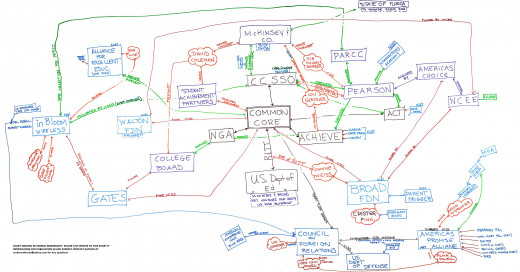Common Core Standards: A Costly and Ineffective Prescription for Schools

Note: Common Core State Standards (CCSS) have now been renamed College and Career Readiness Standards CCRS) in an apparent attempt to avoid the controversy of national versus state control of education and to cash in on the educational buzz words, “college readiness.” I will refer to them simply as Common Core Standards.
Commonly stated goals for the Common Core Standards are: to meet the needs of students and prepare them with “rigorous” standards for college. Not only are the goals of common core unrealistic, not every student wants or is able to go to college, but the standards also fail academically.
Here is a definition from commonoresolutions.com:
“The Common Core Standards Initiative is a collaborative effort led by the National Governor’s Association and the Council of Chief School Officers with partners and leaders across education and business, aimed to establish a shared set of clear educational standards for English language arts and mathematics that states can voluntarily adopt. The intention of the CCSS is to have a rigorous set of standards that specifically identify the learning outcomes needed to help schools prepare students to be college and career ready.” In reality, the standards are not “voluntary” to adopt in the true sense of the word, nor do they prepare students for college.
While the standards may have been a “collaborative effort” between governors and “Chief School Officers”, current teachers, students and parents who will be effected by these standards were not consulted. Moreover, the “business leaders” come from companies that will benefit financially from more testing and selling of Common Core normed textbooks.
An alliance of corporations, CEOs and politicians have been working to strong arm states into using national common core standards. So far they have succeeded.

The public has been convinced by educational “reformers” like Michelle Rhee and Arne Duncan, politicians like Chicago Mayor Rahm Emanuel and President Obama and think-tanks like ALEC that are populated by people in the publishing industry and D.C. politicians that teachers are the problem and that testing is the solution. They have added Common Core Standards to the prescription from the false diagnosis.
Reformers use a false benchmark of student progress, standardize tests, and diagnose the problem as being certain schools and teachers. However, research bears out that the problem of student achievement is clearly income inequality in our nation; students in families with lower income on average do worse on high stakes tests. But addressing the structural problem of income inequality in our nation is much harder than blaming teachers and giving tests.
So reformers take an inaccurate diagnosis and prescribe a solution to it, more testing and new and improved standards, the Common Core. That would be like a doctor telling a patient their problem is their heart when actually the patient is hungry and just needs more food. So the doctors give them expensive surgery and drugs. Meanwhile, the patient is starving.
Common Core has not been field tested. We don’t know if it can accurately predict success in college or not. “No one can explain why all 8-year-old students in America should be tested to see if they are on a path for college. As for careers, most of them probably want to be cowboys or police officers or astronauts.” (Daily News) But these standards are to be used for both elementary and secondary education.
Common Core Standards have not been bench-marked to international standards as claimed. Arizonans Against Common Core, in fact, demonstrate the opposite, “Common Core's 'college readiness' standards for English language arts and reading do not aim for a level of achievement that signifies readiness for authentic college-level work. They point to no more than readiness for a high school diploma (and possibly not even that, depending on where the cut score is set). Despite claims to the contrary, they are not internationally benchmarked.”

The Common Core Standards were developed out of the push for standardized testing and No Child Left Behind. Even though this change will cost the states billions of dollars and dramatically change the way content is delivered to students, two-thirds of Americans have not heard of Common Core State Standards. And the proponents of Common Core are unwilling to discuss the fact that states already had standards that have been tested through years of use. They tell us that “we need standards” even though states already had them. (EdWeek)
As Dr. McDermott points out, “"The whole thing about better tests and if we had better standards is like a bait-and-switch … so nobody pays attention to the real issues," she said.” (Truthout)
The real issues include unequal funding in our schools and poverty at home, as well as classroom overcrowding and poorly kept buildings and other facilities.
Common Core proponents are saying that the standards are designed to help the United States catch up academically. However, James Milgram, professor of Mathematics at Indiana University tell us that they are two years behind international standards. Moreover, he tell us that Indiana Standards are already stellar, especially in math. And he’s not the only academic to make such a critique. So what are the incentives to change to national standards if states already have good standards?
Proponents of Common Core Standards like to tout that forty-five states have adopted them since they were written in 2010. However, they fail to mention that their adoption was extorted from the states when Education Secretary Arne Duncan made adopting the Common Cores a condition of receiving part of the $4.35 billion dollars in Race to the Top funds. So, those states that wanted extra money for education during an economic downturn would sign on to the standards. Those that did not want the extra funds would not implement the Common Core Standards. Is that really much of a choice?
It’s a marketplace for corporations, not ideas, “As Secretary Duncan’s chief of staff wrote at the time, the Common Core was intended to create a national market for book publishers, technology companies, testing corporations, and other vendors.” (Ibid: EdWeek)
And because of the lack of time to review the stands, “…Some states…adopted them without seeing a finished draft.” Can you imagine Apple, IBM, Microsoft or major film studios releasing a product before it was tested? Well, that’s what happened with the Common Core. Moreover, adoption of the standards have provided a boon for technology companies, “Los Angeles alone committed to spend $1 billion on iPads for the tests…” (Ibid: washingtonpost.com)
There are about 100 million school children in the United States. “If 75 million children are tested yearly at $30 each, the bill will be $2.25 billion a year, not counting the cost of the hardware and software. No wonder the technology and education service companies are counting their profits.” (HuffPo) Meanwhile, more than half of states have recently cut education spending and 37 states spend less than they did before the recession began in 2008. How are cuts to education and more spending on untested Common Core Standards and standardized tests going to improve educational outcomes?

Despite claims by Common Core proponents, academic improvement has not occurred in states that have adopted the standards:
• In New York, “Test scores plummeted earlier this year. State officials had predicted the scores would drop 30 percent — and that’s exactly what happened.”
• Scores over all went down in Mississippi after four years of Common Core. How did that happen if Common Core is the answer?
•Minnesota also had a drop in test scores in reading, the benchmark for Common Core Standards. And that could mean the closure of many schools.
They are punishing schools, students and teachers for bad federal decisions on education and testing. “George W. Bush’s No Child Left Behind and Barack Obama’s Race to the Top have combined to impose a punitive regime of standardized testing on the schools...by 2014, said the law, every child must be “proficient” or schools would face escalating sanctions. The ultimate sanction for failure to raise test scores was firing the staff and closing the school.” And the majority of the school closings occurred in minority, mainly black, school districts.
In Pearson’s Common Core writing video on the Pearson website, they discuss the importance of writing. Ironically, they mention good writers in history such as Obama, Sotomayor, Lincoln and Dr. King. The problem is that not one of these people learned to write using Common Core Standards, but CCS is being sold as the answer. How did people learn how to write or do math before the Common Core Standards? The Common Core is a bill of goods that is unnecessary and costly.

To have your family opt out of the Common Core Standards, click and fill out the form here.
Peace,
Tex Shelters

![Education - Solution 4 - Set Minimum Academic Standards at the National Level and Let States Improve Upon Them! [55]](https://usercontent2.hubstatic.com/5123651_f120.jpg)




